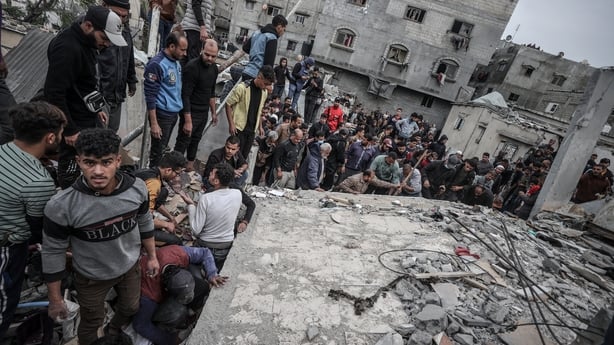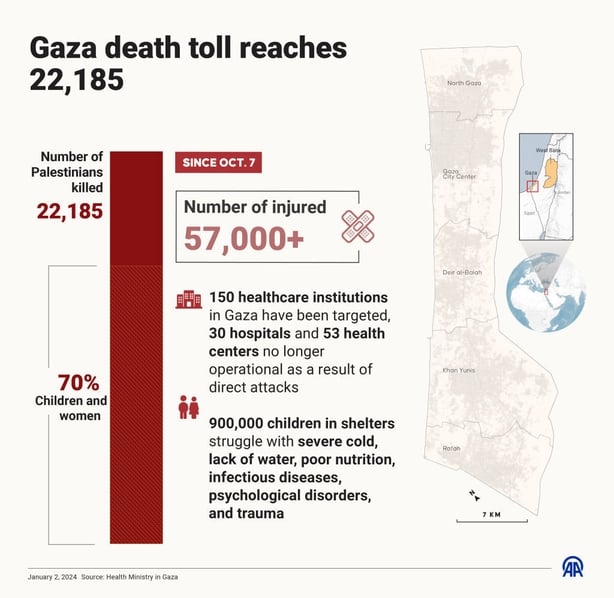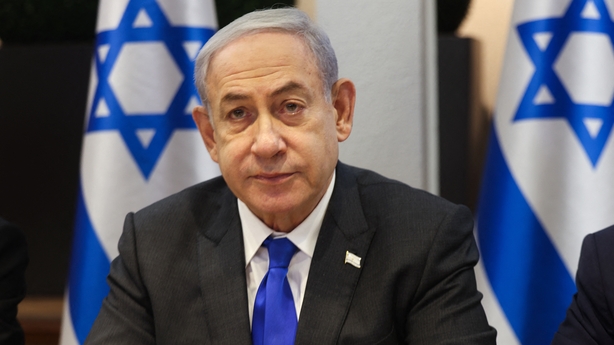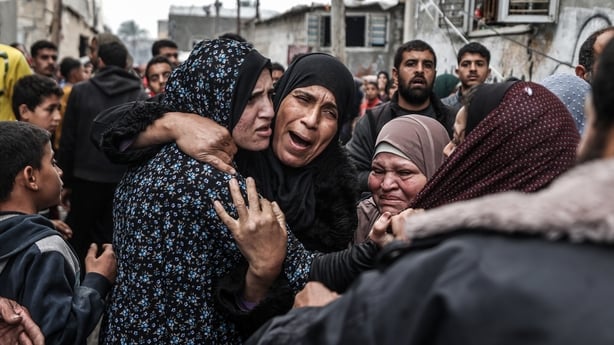A total of 22,185 Palestinians have been killed and 57,035 wounded in Israeli strikes on Gaza since 7 October, including 207 fatalities in the past 24 hours, the Gaza health ministry said.
Israel said that its troops had killed dozens of militants in the north of Gaza in the past day, while its aircraft and tanks stepped up strikes in the south of the Palestinian enclave.
Residents said heavy fighting was also raging in central areas, citing shelling by Israeli tanks of parts of the Al-Bureij refugee camp.
Some 207 Palestinians were killed and 338 were wounded in the past 24 hours, the Gaza health ministry said, bringing the total recorded Palestinian death toll to more than 22,000 in nearly three months of warfare in the Hamas-ruled enclave.
The latest fighting took place after Israel announced plans to pull back some troops, signalling a new phase in the war against Hamas amid global concern over the plight of Gaza residents.
It also comes as the war reached Beirut in Lebanon, where a senior Hamas official was killed in a drone strike.
Israeli bombardments have reduced much of the territory to rubble and engulfed its 2.3 million residents in a humanitarian disaster in which many have been left destitute and threatened by famine due to a lack of food supplies.

Israeli officials say the offensive has many months to run.
In its daily briefing, the Israeli military said that in the past day its forces had targeted militants in Gaza City in the north of the enclave and in unspecified locations along the Mediterranean coast.
"In Jabaliya area, troops killed dozens of terrorists, among them those who attempted to plant explosive devices, others who operated drones and those who were armed identified driving toward the forces," the military said.
Troops also seized weapons and dismantled rocket launchers in Khan Younis in the south and in a United Nations school in Al-Bureij, Israel's military said.
An Israeli official said the situation on the border with Lebanon, where Israeli forces and Lebanese Hezbollah fighters have exchanged artillery fire almost daily, would not be allowed to continue.
"This coming six-month period is a critical moment," the official said.

At a house in the centre of Khan Younis, medical teams retrieved the bodies of two women killed in an Israeli air strike this morning, health officials said.
Hamas and Islamic Jihad said in separate statements they had fired mortar bombs and anti-tank rockets against Israeli forces in Khan Younis and were stopping them advancing to the western area. Tanks have been stationed east, north and at the centre.
Hamas' armed wing yesterday claimed to have killed 15 Israeli soldiers after triggering an explosive minefield east of the Tuffah neighbourhood in Gaza City.
Read more:
Blair denies link to role in 'resettlement' of Gazans
Latest Middle East stories
Hamas also showed its continued ability to target Israel after more than 12 weeks of the war, firing rockets at Tel Aviv.
The Gaza war was triggered by a surprise Hamas attack on Israeli towns on 7 October that Israel says killed 1,200 people.
Palestinian health authorities in Gaza say Israel's retaliatory offensive has so far killed at least 22,185 people, making it the bloodiest episode in the wider, decades-long Israel-Palestinian conflict.
Israel has promised to wipe out Hamas, but it is unclear what it plans to do with the enclave should it succeed in subduing it, and where that leaves the prospect of an independent Palestinian state.
It has signalled a new phase in its offensive, with the Israeli official saying yesterday the military would reduce its forces inside Gaza this month and shift to a months-long phase of more localised "mopping up" operations.
The troop reduction would allow some reservists to return to civilian life, shore up Israel's war-battered economy, and free up units in case of a wider conflict with the Iran-backed Hezbollah, the official said.

A US official said the decision appeared to indicate the start of a shift to lower-intensity operations in the north of Gaza. Washington has been urging Israel to reduce the intensity of its military operation.
But Avi Dichter, a member of Israel's security cabinet, said on Kan Radio: "Without Hamas' terrorist infrastructure being destroyed and its governance capabilities toppled, the war will not end."
Another prime concern for Israel is the return or rescue of hostages held by Hamas.
The militants seized 240 hostages on 7 October and Israel believes 129 are still held after some were released during a brief truce and others killed during air strikes and rescue or escape attempts.

Qatar and Egypt are seeking to negotiate a new truce and hostages deal.
Residents of Sheikh Radwan district in Gaza City, which the Israeli offensive first focused on, said tanks had withdrawn after what they described as the most intense ten days of warfare since the conflict began.
"The tanks were very near. We could see them outside the houses. We couldn't get out to fill water," said Nasser, a father of seven living in Sheikh Radwan.
Tanks also pulled out of Gaza City's al-Mina district and parts of Tel al-Hawa district, while retaining some positions in the suburb controlling the enclave's main coastal road, residents said.
Israel to appear before ICJ
Meanwhile, Israel will appear before the International Court of Justice (ICJ) at the Hague to contest South Africa's genocide accusations over the war with Hamas in Gaza, an Israeli government spokesman said.
South Africa asked the ICJ on Friday for an urgent order declaring that Israel was in breach of its obligations under the 1948 Genocide Convention in its crackdown against Hamas.
"The State of Israel will appear before the International Court of Justice at the Hague to dispel South Africa's absurd blood libel," spokesman Eylon Levy told an online briefing.
"We assure South Africa's leaders, history will judge you, and it will judge you without mercy," Mr Levy said.
The ICJ, sometimes known as the World Court, is the United Nations venue for resolving disputes between states. Israel's foreign ministry has said the suit was "baseless".

